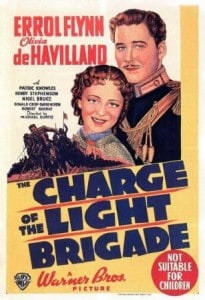Half a league, half a league,
Half a league onward,
All in the valley of Death
Rode the six hundred:
“Forward, the Light Brigade!
Charge for the guns,” he said:
Into the valley of Death
Rode the six hundred.
—opening of The Charge of the Light Brigade by Alfred, Lord Tennyson
Considering that anything close to sophisticated film scoring hadn’t been around all that long, 1936 was a reasonably good music year for the movies. The clear, hands down winner of the Best Score Oscar was Erich Wolfgang Korngold for Anthony Adverse. Fellow Warner Brothers composer Max Steiner received two nominations, for The Charge of the Light Brigade and The Garden of Allah for the Selznick Studios. The two other nominees were Werner Janssen for The General Died at Dawn and Nathaniel Shilkret for Winterset. Though now generally forgotten, both men had not only distinguished music careers but long, productive lives.
Also in 1936, director Charlie Chaplin, who also dabbled at scribbling music, wrote for his Modern Times melodies that were transformed into score form by composer David Raksin and orchestrator Eddie Powell. Alfred Newman was active that year with Dodsworth and These Three, scores that were pale shadows of his lyrical, polished style to come. More impressive was the work of Virgil Thomson, one of those so-called “serious” composers, as distinguished from that other—some say “lower”—breed of men who write film music. As Steiner often did, Thomson incorporated popular and traditional tunes in an over-all impressive score for the government-sponsored documentary The Plow That Broke the Plains.
